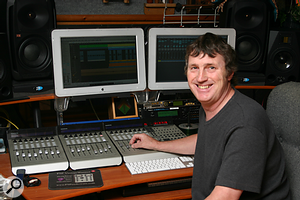While many project-studio owners are now happy to do much of their recording work on computers, there still seems to be a degree of resentment at having to pay for software updates — you only have to check out some of the comments which followed the upgrade to Apple's Logic 7 on the SOS Forum to be convinced of that! And yet, when similar upgrades can be carried out on our studio hardware and they significantly expand what we can do with it, there seem to be far fewer complaints. Take computers themselves — there's a well-established culture of people swapping out motherboards and upgrading soundcards on the PC platform, and in recent years Mac owners have started to get in on the action too, with processor upgrades, flashier graphics cards and faster drives. Computer fairs, where all this stuff can be bought and traded, continue to be popular too. But perhaps it's not surprising. After all, what would you rather have — something that can be updated for a sensible cost, or something that gradually becomes obsolete at no extra charge?
And it's not just computers. You can add new sounds to some hardware synths by fitting optional expander cards, and this very ability to pay for new functionality is one reason why instruments like the old Roland JV1080 and 2080 are still so widely used today. Then there are the digital hardware products that have chargeable OS updates to add to their functionality. For example, simply by visiting the Line 6 web site and parting with a little cash, you can add some very nice new amp and effects models to your Pod XT guitar recording preamp, which more than justify the relatively small cost involved.
Similarly, as Hugh Robjohns explained last month, you can add new functionality to some of Yamaha's digital mixing consoles by paying for additional software that adds new reverbs or plug-in-style processing capability. Perhaps because the product being updated is hardware, nobody seems to question the fact that you have to pay out to improve it. But with software, it's often a different story. Why is this?
There seems to be a significant sector of the computer-using community that expects free software updates as some kind of inherent human right, even though somebody clearly has to do a lot of work to create those new versions, and someone has to pay that person's wages. In fact, there are still those totally illogical people who think that all software should be free, no matter how much effort has been put into creating it — but that's an argument for another day!
I'm sure those people wouldn't want to leave their front doors open with a 'Help Yourself To All My Stuff' sign outside, yet that seems to be exactly what they expect from software companies. If you think it's frustrating having to update your plug-ins because a new OS has changed the rules, think how frustrating it must be for a software company to have to dedicate time and effort to jumping through all the new hoops when they could be using their R&D effort to develop new products. And, of course, some updates are still made available free of charge — but when it comes to a major update that adds new features as opposed to basic bug-fixes, I can't see why paying for it is in any way unreasonable. After all, in hardware terms, paying for a software upgrade is like being able to take your old synth back to the shop, pay out a small percentage of the original cost and then walk away with the latest model in exchange.
And by registering as a paid-up user of a new software version, you're renewing your right to support, which is like getting a new warranty for your aging hardware, and certainly a lot more impressive than those extended hardware warranties that cost a significant proportion of the original price and still manage to expire two weeks before the item in question erupts in a puff of smoke! If only you could do all of that with hardware, I wouldn't have a cupboard full of old rack boxes and laughably out-of-date computers sitting around doing nothing!
Paul White Editor In Chief
